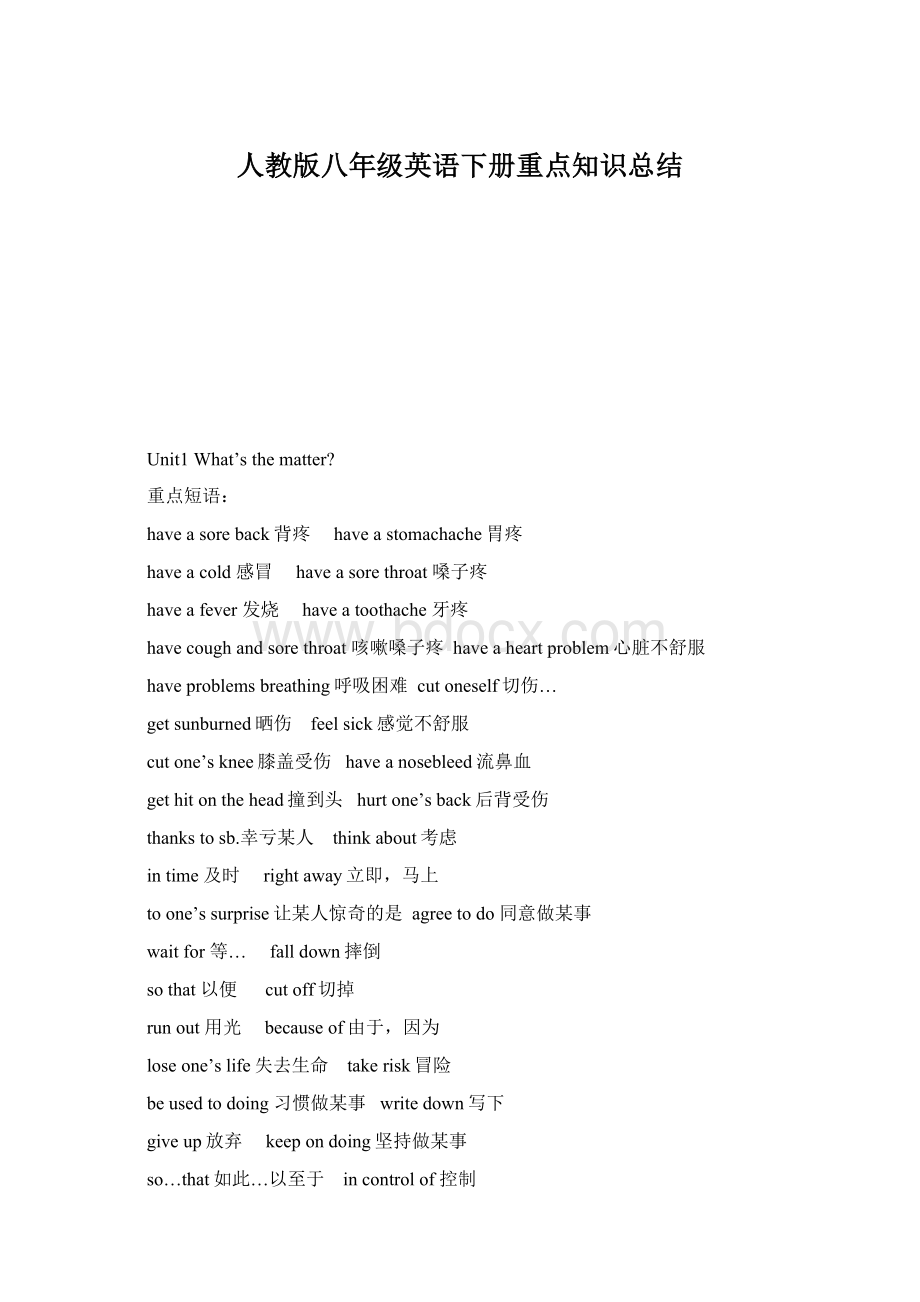人教版八年级英语下册重点知识总结.docx
《人教版八年级英语下册重点知识总结.docx》由会员分享,可在线阅读,更多相关《人教版八年级英语下册重点知识总结.docx(69页珍藏版)》请在冰豆网上搜索。

人教版八年级英语下册重点知识总结
Unit1What’sthematter?
重点短语:
haveasoreback背疼haveastomachache胃疼
haveacold感冒haveasorethroat嗓子疼
haveafever发烧haveatoothache牙疼
havecoughandsorethroat咳嗽嗓子疼haveaheartproblem心脏不舒服
haveproblemsbreathing呼吸困难cutoneself切伤…
getsunburned晒伤feelsick感觉不舒服
cutone’sknee膝盖受伤haveanosebleed流鼻血
gethitonthehead撞到头hurtone’sback后背受伤
thankstosb.幸亏某人thinkabout考虑
intime及时rightaway立即,马上
toone’ssurprise让某人惊奇的是agreetodo同意做某事
waitfor等…falldown摔倒
sothat以便cutoff切掉
runout用光becauseof由于,因为
loseone’slife失去生命takerisk冒险
beusedtodoing习惯做某事writedown写下
giveup放弃keepondoing坚持做某事
so…that如此…以至于incontrolof控制
makegooddecisions做正确的决定liedown躺下
seeadentist看牙医getanx-ray照x光
takeone’stemperature量体温putsomemedicineonthecut把药撒在伤口上
gotothehospital去医院getoff下车
thinktwice三思,考虑seesb.doingsth.看见某人做了某事;
toomuch太多(…);enough+water足够的水;
adj./adv.+enough足够…
重点句型:
1.–What’sthematter(with…)?
=What’swrong(with…)?
=Isthereanythingwrong(with…)?
Ihavea…
2.Doyouhavea…?
/Doeshehavea…?
3.--Whatshouldshedo?
--Sheshouldtakehertemperature?
4.–ShouldIputsomemedicineonit?
--Yes,youshould./No,youshouldn’t.
重点语法:
1.should表示建议的用法
(1)表示提出建议,意为“应该,应当”
e.g.Youshouldlistentomusicwhenyouaretired.
(2)表示可能性或判断、推测、推论
e.g.Idon’tknowwhoshouldspeakfirst.
Heshouldbearound70years.
(3)shouldn’t用来表示责备或批评,意思是“不应该”
e.g.Youshouldn’tspendtoomuchtimeonTV.
(4)ShouldI…?
用来征求意见、提供帮助或请求指示
e.g.ShouldIbuythebookforyou?
(5)should表示委婉客气第表达某种想法,意为“倒想,想”
e.g.Ishouldadviseyoutosaylessanddomore.
(6)should表示说话人的感情,如:
惊奇、愤怒,失望
e.g.It’ssurprisingthatMaryshouldlovesuchapersonasJack.
(7)用于虚拟语气中
e.g.Ifsheaskedmetomorrow,Ishoulddoit.
Exercises
根据汉语意思完成句子
1.你现在应该戒烟了。
You________________________smokingnow.
2.你应该和你的老师讨论一下这个问题。
You________________thisproblem________yourteacher.
3.你应该感谢你的老师的帮助。
You________________yourteacherforhis________.
4.我们应该节约水。
We________choose________________.
5.她摔倒并上到了自己。
Shefelldownand________________.
2.一般过去时的用法:
(1)表示过去的某种状态:
e.g.Hewasadriverlastyear.
(2)表示过去经常反复发生的动作:
e.g.Hesawanoldmanlyingonthesideoftheroad.
(3)beusedtodoing习惯作某事
3.when引导的时间状语从句:
当主句和从句动作都发生在过去,如果有时间的交点,哪个动作先发生哪个动作使用过去进行时,另一个动作使用一般过去时。
e.g.Iwasjustgettingintotheshowerwhenthetelephonerang.
重点知识点:
1.What’sthematter?
怎么了?
/出…了什么事?
用于询问对方有什么问题或有什么不顺心的事,也用于询问某物出了什么故障。
What’sthematterwithsb./sth.?
某人/某物怎么了?
[同]What’swrongwith…?
What’sthetroublewith…?
2.have/hasa+病痛/病症的名词得了….(病)
e.g.--What’sthematterwithyou?
--Ihave(got)atoothache.
*haveastomachache/fever/headache/sorethroat/toothache/cough
胃疼/发烧/头疼/喉咙痛/牙痛/咳嗽
3.
(1)muchtoo太…修饰adj./adv.
e.g.Thisdishismuchtoosalty.
(2)toomuch太多(的)修饰不可数名词/动词
e.g.TodayIhavetoomuchhomeworktodo.
Don’tspeaktoomuchatthemeeting.
(3)toomany太多的…修饰复数名词
e.g.Ihavetoomanyquestionstoask.
(4)somany如此多修饰复数名词
e.g.Therearesomanycarsinthestreethere.
(5)somuch如此多修饰不可数名词
e.g.Therewassomuchfoodthatwecouldn’teatitall.
4.enough
(1)enough+n.或n.+enough足够的…
e.g.Wehaveenoughmoney/moneyenoughtobuyacar.
(2)adj./adv.enough足够地…..
e.g.Thisbookiseasyenoughforasix-year-oldchildtoread.
5.lie
(1)躺,平躺(lay,lain)liedown躺下
e.g.Pleaseliedown.
位于
e.g.Thetownliesonthecoast.
(2)说谎(lied;lied);谎言
e.g.Don’tlietome!
*tellalie说谎;*lieaboutsth.tosb.就某事对某人撒谎
6.with+名词+介词短语作伴随状语,表示主语的状态
e.g.Thereisabighousewithabeautifulgardennearthepark.
TomisanEnglishboywithshortandcurlyhair.
without+名词/代词/动名词
e.g.Shewenttobedwithoutfinishingherhomework.
*without用于否定句,表示条件,意为“如果没有”,可以和if引导的否定条件状语从句替换。
e.g.Wecan’tfinishtheworkwithoutyourhelp.
=Wecan’tfinishtheworkifyoudon’thelpus.
7.seesb.doingsth.看见某人正在做某事(即看见的行为或事件正在进行).
seesb.dosth.看见某人做了某事(看见了某人做某事的全过程)
*hear,watch,feel,notice用法和see一样。
e.g.–ItriedtomakeAlice________hermindbutIfounditdifficult.
--Well,Isawyou______thatwhenIwentpast.
A.changed,doB.changes,doingC.change,todoD.change,doing
8.
(1)expect盼望,期望(侧重于相信或认为有可能实现的愿望)
expecttodosth.期望/希望/预料做某事
expectsb.todosth.期望/希望/预料某人做某事
expectthat期望/希望/预料…
(2)wish想要,希望,祝愿(常用来描述不可能或可能性较小的事情)
wishtodosth.希望做某事
wishsb.todosth.希望某人作某事
wishthat希望…(从句使用虚拟语气be用were)
(3)hope希望(主要描述可能形较大的事情)
hopeforsth.希望得到某物
hopetodosth.希望作某事
hopethat…
9.
(1)agreewitha.同意,赞成(接表示人的名词或表示意见、看法的名词或代词作宾语)
b.(气候、食物等)适合e.g.Doessheagreewithus?
(2)agreeto同意,赞成(接表示提议、办法、计划、安排等的名词、代词或动词原形)
e.g.Theyagreetosolvetheproblem
(3)agreeon就……取得一致意见(指双方或多方就某个问题取得了一致的意见或是达成了某种协议,与agreeindongsth.含义相同)
e.g.Wefinallyagreedonthepriceforthehouse.
10.thanksto多亏了…..;幸亏;由于…..的帮助[同]becauseof…;withthehelpof…;
withone’shelp…
e.g.Thankstoyourhelp,Ifinishtheworkontime.
Thankstomyteacher,Ipassedtheexam.
*thankfor…因……而感谢
e.g.Thanksforyourhelp.
Thanksforinvitingme.
11.intime及时(按照预定的时间行事,不迟、尚有充裕的时间可做些别的事)
ontime准时,按时(正好在规定的时间内)
12.trouble构成的短语
(1)getintotrouble造成麻烦或烦恼
(2)havetrouble(in)doingsth.做某事有困难
(3)havetroublewithsth.因某事而苦恼(4)askfortrouble自寻烦恼
(5)introuble陷入困境
13.hitsb.on/inthe+身体部位(身体部位凸起的用on,柔软或下凹的用in)
e.g.Shehitmeonthebackofthehead.
Heswunghisarmandhitmeintheface.
14.rightaway马上,立刻[同]atonce,inamoment,inaminute
15.takeone’stemperature测量某人的体温
16.soundlike听起来(像……)*like是介词,后接名词、代词或动名词
17.byaccident[同]bychance偶然地,意外地
e.g.Shefoundougthetruthbyaccident.
18.ill,illness,sick
(1)illadj.生病的(worse,worst)只作表语,不作定语
e.g.Themanisill.(right)Heisanillman.(wrong)
(2)illness是ill的名词形式
e.g.Shecan’tgotoschoolbecauseofherillness.
=Shecan’tgotoschoolbecausesheisill.
(3)sickadj.生病的可作表语,也可作定语。
作表语时还可以表示“恶心的;要引起呕吐的”等意思。
e.g.Pleasetakegoodcareofthesickboy.
Whenhegotup,hefeltalittlesickandtooksomemedicine.
19.反身代词
构成:
第一二人称:
形容词性物主代词+self或selves
第三人称:
代词宾格+self或selves
与反身代词搭配的动词有:
enjoyoneself玩得高兴;过得愉快helponeself请便
helponeselfto…请便/请随便吃…loseoneselfin迷恋;沉醉于
allbyoneself独自地;byoneself独自
cometooneself苏醒,恢复意识
20.
(1)beusedto(doing)sth.习惯于(做)某事
e.g.Heisusedtolivinginthecity.
(2)beusedtodosth.被用来做某事
e.g.Woodisusedtomakepaper.
(3)beusedfor+名词或动词-ing用来作某事
e.g.Astampisusedforsendingletters.
(4)usedtodosth.过去常常做某事(现在不做了);过去曾经作某事[只用于过去时]
e.g.Iusedtospendalotoftimeplayinggameswithmyfriends.
21.
(1)runoutofvt.用完;用光必须是人作主语,相当于useup,多用于进行时或完成时
e.g.Ihaveusedupofmymoney.
(2)runoutvi.用完主语通常是时间、金钱等无生命的事物。
e.g.Whatdoyouplantodowhenyourmoneyrunsout?
22.
(1)sothat以便;为的是(引导目的状语从句)
e.g.Theyclimbedhighersothattheymightseefarther.
(2)so+adj./adv.that…如此……以至于……(引导结果状语从句)
e.g.Hespokesofastthatnoonecouldunderstandhim.
(3)such+adj.+名词复数+that…
sucha/an+adj.+名词单数+that…;
such+adj.+不可数名词+that
(4)so…that=inorderthat…如此…以至于…
e.g.Shegotupearlythismorningsothat/inorderthatshecouldcatchthefirstbus.
(5)so…that…(从句是否定句)可以用too…to..或too...forsb.todo替换
e.g.Mysonissoyoungthathecan’tgotoschool.
[同]Mysonistooyoungtogotoschool.
(6)so…that(从句是肯定句)可以用…enoughforsb.todo…替换
e.g.HeransoslowlythatIcouldcatchupwithhim.
[同]Heranslowlyenoughformetocatchupwithhim.
23.becalled/named被叫作…
e.g.Thisboyiscalled/namedTom.
Thefloweriscalled/named“rose”.
24.meanvt.意思是,打算,意欲(表示一个人的言论或行为、某一标志或词语的意思所指)
e.g.Successmeansworkingveryhard.
Idon’tknowwhatyoumean.
meaningn.意思e.g.Itdoesn’tseemtohavemuchmeaning.这似乎无多大意义。
means方法;手段;工具(单复数同形)e.g.Therearenomeansofgettingthere.
25.makea/one’sdecision(s)下决心;作出决定=makeupone’smind(s)
e.g.Thedocumentwillneedacarefulgoing-overbeforewemakedecision.
我们要对文件仔细审阅后再做决定。
*makeadecisiontodosth.下决心做某事=decidetodosth.
26.
(1)beincontrolof..掌管;管理e.g.Ateachermustbeincontrolofhisclass.
(2)beoutofcontrol无法管理;失去控制
(3)beundercontrol被控制住;在控制中
27.diev.死,死亡(因生病、年老、负伤等原因而死,是非延续性动词,不能和表示一段时间的状语连用)
deadadj.死的;无生命的(表示状态,可以和表示一段时间的状语连用。
如果表示“死了多长时间”用have/hasbeendeadfor+时间段或died+时间段ago)
dyingdie的现在分词,作定语或表语,意为“垂死的;要死的”
deathdie的名词,意为“死,死亡”,在句中作主语或宾语
e.g.Thedyingcaptainlookedathisdeadsoldiersandsaid,“Weliveforthepeopleanddieforthepeople;itisworthydeath.”
那位奄奄一息的上尉看着牺牲的战士说:
我们为人民而生,为人民而死;死得其所.
28.mindv.介意;反对
(1)Would/Doyouminddoingsth.?
劳驾,请你做….好吗?
或请问,你可否做某事?
(用来表示委婉、客气的请求)
e.g.Wouldyoumindclosingthedoor?
(2)Would/Doyoumind+人称代词宾格或形容词性无主代词+doingsth?
某人做某事你介意吗?
e.g.Doyoumindmyclosingthewindow?
(3)Would/Doyoumindif–从句?
你是否介意….?
e.g.DoyoumindifIclosethewindow?
*changeone’smind改变主意*makeupone’smind下决心
*keepinone’smind牢记*inone’smind在某人的脑海中
29.
(1)keepondoingsth.继续做某事(强调动作反复多次,中间有间隔,即“一再做某事”,强调重复性。
还暗指不顾困难、反对、警告而“坚持”做某事)
e.g.Theoldmankeptontellingusthesamestory.
(2)keepdoingsth.一直做某事(强调动作的持续不间断,无停顿,强调连续性。
)
e.g.Hekeptwritinguntilhiswifecameback.
(3)keepsb./sth.fromdoingsth.表示“阻止某人/某物做某事”
e.g.Becareful!
Keeptheglassfromdroppingontothefloor.
(4)keepsb.doingsth.表示“让某人一直做某事”
e.g.OurChineseteacherkeptusrea